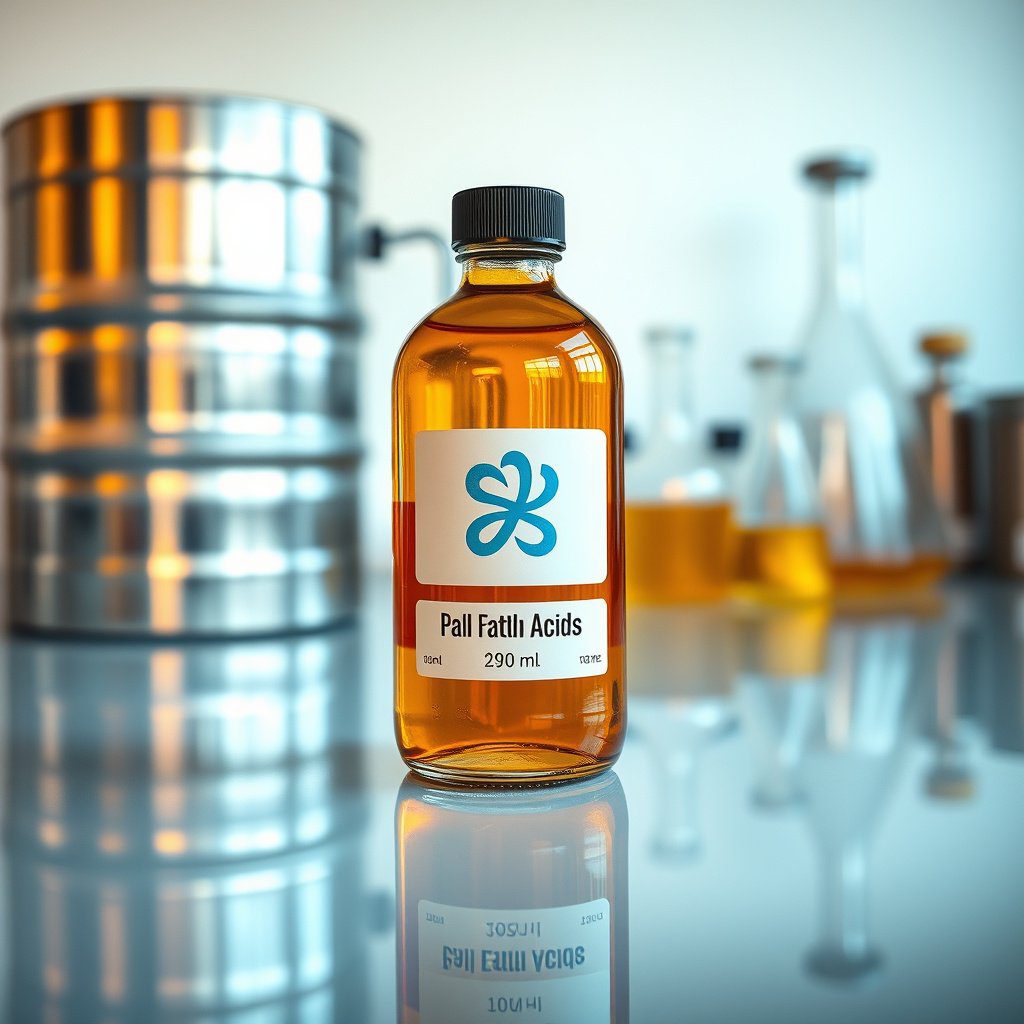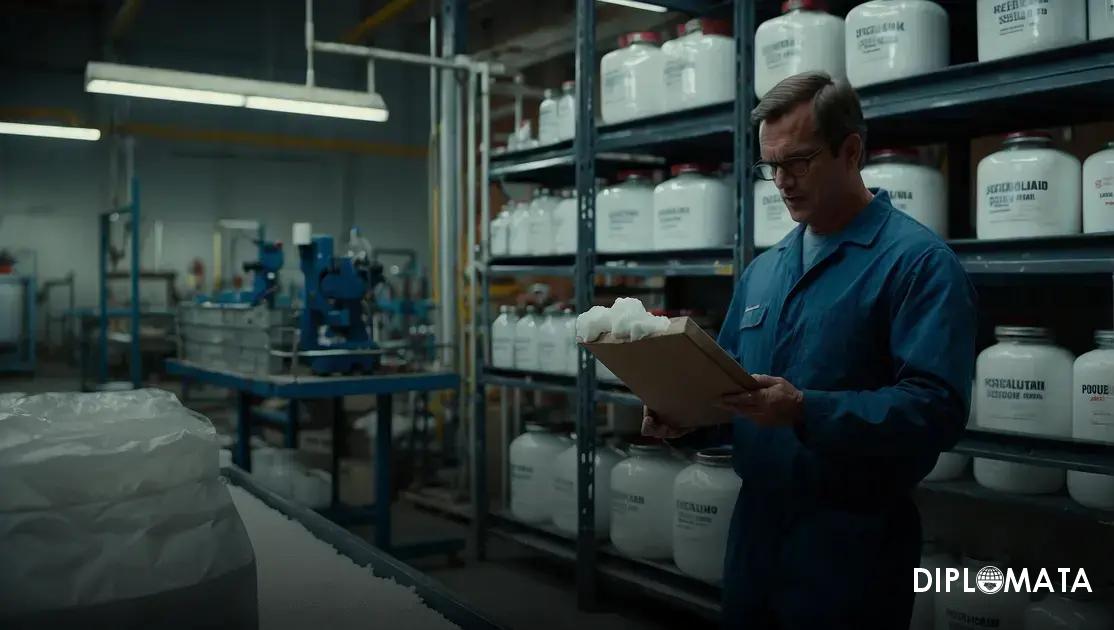Impact of Import Policies on the Global Palm Fatty Acids Supply is more than a regulatory topic.
It’s a map of how trade rules shape availability, price, and reliability for manufacturers that rely on palm fatty acids as a key raw material.
As a company with two decades in the chemical and oleochemical industries, Diplomata Comercial has watched import policies shift the playing field across regions, from Asia to Europe to the Americas.
Our experience translating policy into predictable sourcing enables clients to stay ahead of disruptions, maintain quality, and sustain growth even when trade winds change.
This guide presents practical, business-forward guidance for navigating policy-driven dynamics, with actionable steps you can implement today to safeguard your supply chain and your margins.
We’ll connect policy insights to real-world sourcing decisions, showing how the right partner can turn regulatory complexity into a competitive advantage for your operations.
Understanding the Global Palm Fatty Acids Landscape under Import Policies
Key Policy Instruments that Shape the Market
Several instruments consistently influence the palm fatty acids market. Tariffs affect landed cost and pricing strategies, while quotas regulate volume and planning horizons. Import licenses and certificates of origin govern eligibility, and customs procedures determine the speed of entry.
In addition, sanitary and phytosanitary standards (SPS) and sustainability requirements shape which shipments move freely and which need extra documentation.
For manufacturers, understanding these levers helps in forecasting, supplier selection, and contract design.
Diplomata Comercial translates regulatory language into practical actions, from aligning documentation to pre-clearing shipments with customs authorities.
Beyond the basics, market incentives in different regions create ripples.
Some markets reward earlier compliance with red-carpet clearance, while others impose stricter traceability demands that affect data collection, audit trails, and supplier qualification cycles.
The outcome? A robust sourcing plan that anticipates policy changes reduces risk and preserves continuity.
In practice, a proactive approach looks like mapping regulatory expectations against procurement cycles, then building flexible agreements that accommodate policy shifts without compromising delivery timelines.
This is where our team blends regulatory insight with operational discipline to deliver tangible results for our clients. Regulatory intelligence, document control, and supplier qualification are not afterthoughts; they’re core components of a resilient supply chain.
How Import Policies Affect Availability and Pricing
Import policies directly influence whether palm fatty acids exist in the right grades, at the right purity, and at the right time.
When policy becomes more restrictive, availability can tighten, driving lead times higher and costs up due to increased compliance burden.
Conversely, a stable, well-communicated policy environment can unlock smoother clearance, lower risk of stockouts, and better forecasting accuracy.
Pricing dynamics reflect more than crude oil and energy markets.
Duty regimes, licensing fees, and non-tariff barriers can alter the landed cost even when product prices are stable.
For buyers, the implication is clear: align procurement strategies with policy calendars, maintain close relationships with trusted suppliers, and diversify sourcing to hedge policy risk.
At Diplomata Comercial, we emphasize proactive pricing models, contingency stock planning, and transparent cost breakdowns to ensure our partners understand the true cost of import-related decisions.
To translate policy into practice, consider building a policy-inclusive procurement plan that includes risk-adjusted lead times, alternative routing options, and flexible order quantities.
This minimizes the impact of sudden policy shifts on production lines and helps protect margins during volatility.
Market Regulation and Its Impact on Palm Fatty Acids Supply
Regulatory Harmonization vs Fragmentation
Global trade often walks a balance between harmonization and fragmentation.
While some regions push for consolidated standards to facilitate trade, others emphasize national or local requirements that create fragmentation.
For palm fatty acids, this can impact the acceptable fatty acid profiles, refining methods, and the documentation trail required for import.
A harmonized framework simplifies supplier qualification, reduces duplicate audits, and speeds up clearance.
However, fragmentation isn’t inherently negative if managed properly; it can drive suppliers to tailor compliance programs that meet diverse market demands.
Diplomata Comercial supports clients by mapping regulatory expectations across regions, identifying which standards matter most for their end-use sectors, and coordinating with suppliers to maintain consistent quality.
From a practical standpoint, this means prioritizing suppliers with robust cross-border capabilities, robust quality management systems, and a track record of successful audits in multiple jurisdictions.
It also means staying up-to-date with evolving standards—such as certifications and governance frameworks—that can influence supplier selection and contract terms.
Regulatory alignment also intersects with sustainability expectations.
Markets increasingly reward certified supply chains, making sustainability credentials not only ethical but also commercially strategic.
Our approach weaves regulatory clarity with responsible sourcing, helping partners meet both legal obligations and customer expectations.
The Role of Sustainability and Certification in Regulation
Sustainability is more than a trend; it’s a regulatory and procurement criterion that can determine market access.
Certifications like RSPO for palm products, and other environmental or social governance credentials, have become essential in many buyer and regulator conversations.
Certification reduces risk by providing assurance on supply integrity, traceability, and responsible sourcing practices.
It also unlocks favorable terms with customers who demand verifiable sustainability commitments.
Diplomata Comercial assists clients in navigating certification paths, selecting suppliers with credible programs, and maintaining documentation that proves ongoing conformance.
In practice, investing in supplier audits, digital traceability records, and third-party verification can shorten negotiation cycles and improve tender outcomes.
The result is a supply chain that is not only compliant but also trusted by brands prioritizing ethics and transparency.
Navigating Tariffs, Quotas, and Compliance: A Practical Guide
Tariff Structures and Duty Management
Tariffs are often the most visible policy tool affecting cost of goods.
They may be fixed, tiered, or time-bound, and can change with trade negotiations or policy reviews.
Effective duty management involves classifying products correctly, leveraging any preferential trade agreements, and assessing the benefit of tariff engineering where legally permissible.
For palm fatty acids, a precise tariff classification ensures that you don’t overpay at customs or risk penalties for misclassification.
Diplomata Comercial supports clients by conducting thorough classification reviews, identifying eligible preferences, and coordinating with customs brokers to optimize clearance.
Beyond classification, proactive duty planning includes timing shipments to align with duty cycle resets, selecting carriers that minimize handling charges, and exploring consolidated shipments to maximize space and reduce per-unit duties.
This is how policy-informed procurement becomes a lever for cost optimization rather than a constant pressure.
Import Licenses, Certificates, Documentation
Import licenses and required documentation vary by country and product.
In some markets, licenses must be secured before shipment; in others, documents can be prepared in parallel with logistics operations.
The risk of delays often stems from incomplete certificates of analysis, origin documents, or inconsistent labeling.
A robust documentation package—covering certificates of analysis, MSDS, bill of lading, and regulatory compliance attestations—streamlines customs clearance and reduces the likelihood of stoppages.
Diplomata Comercial emphasizes pre-validation of documents, standardized templates for suppliers, and ongoing training for client teams so that documentation always aligns with current regulatory expectations.
Documentation is not a one-off task.
As policy evolves, so too should the data you collect and the records you maintain.
A sustained focus on data quality and traceability supports audits, supplier verification, and long-term partner relationships.
Customs Procedures and Avoiding Delays
Customs delays often occur due to mismatches between product specifications, documentation, and regulatory expectations.
A practical strategy combines early engagement with customs authorities, pre-clearance where possible, and clear risk flags for high-value shipments.
In some jurisdictions, advance rulings on tariff classifications or temporary import arrangements can de-risk imports during peak demand.
Diplomata Comercial helps clients implement advanced planning processes, collaborate with experienced local brokers, and establish clear escalation paths to resolve clearance issues quickly.
To keep shipments moving, consider building a standard operating procedure for customs that includes: document validation checkpoints, supplier compliance reviews, and a rapid-response team for urgent shipments.
This reduces bottlenecks and stabilizes supply during policy-driven fluctuations.
Building Resilient Supply Chains in a Policy-Driven Environment
Diversification, Geographic Risk, and Supplier Selection
Resilience begins with diversification.
Relying on a single region or a single supplier exposes a company to country-specific policy shifts, currency risks, and logistical bottlenecks.
A diversified supplier base—across stable jurisdictions with transparent regulatory regimes—helps maintain continuity when a policy shift disrupts one market.
Additionally, selecting suppliers with broad certifications, robust data systems, and proven continuity plans reduces operational risk.
Diplomata Comercial works with clients to identify strategic suppliers who can scale, maintain consistent quality, and navigate cross-border compliance with ease.
Geographic risk assessment should include political stability, regulatory predictability, and port efficiency.
The goal is a supply network that can reposition easily if a policy change affects one leg of the chain.
Traceability, Quality Assurance, and Certifications
Traceability underpins policy compliance and brand integrity.
A transparent chain-of-custody demonstrates that palm fatty acids originate from compliant, sustainable sources and meet specification requirements.
Quality assurance programs—emphasizing ISO standards, GMP practices, and supplier audits—help ensure consistent product performance and reduce the risk of non-conformance penalties.
Certifications aren’t just about meeting current rules; they’re the backbone of trust with customers who demand evidence of quality and responsibility.
Diplomata Comercial integrates traceability solutions, rigorous QA protocols, and supplier performance monitoring to deliver reliable, auditable supply chains.
In practice, this means standardizing data capture at the point of origin, maintaining digital records for audits, and partnering with suppliers who demonstrate ongoing commitment to quality improvement.
The payoff is steadier supply, fewer changes to specification, and a stronger value proposition for customers.
Inventory and Safety Stock Strategies
Policy volatility often requires thoughtful inventory planning.
Safety stock buffers protect production lines from import delays, regulatory holdups, or carrier slowdowns.
Balancing inventory levels against holding costs is a core supply chain discipline.
For palm fatty acids, where product specifications and purity are critical, maintaining appropriate stock levels of key grades helps ensure uninterrupted manufacturing.
Diplomata Comercial assists clients in developing inventory scenarios that align with policy risk, demand forecasts, and supplier reliability.
The most effective approach blends data-driven forecasting with policy-aware procurement—allowing teams to respond rapidly to regulatory changes without compromising financial performance.
7 Strategies to Align Palm Fatty Acids Sourcing with Import Policies
Strategy 1: Map the Regulatory Landscape Early
Begin with a comprehensive map of the regulatory landscape across all target markets.
This includes tariff regimes, licensing requirements, origin verification, and sustainability mandates.
The goal is to know where bottlenecks could appear before orders are placed.
Diplomata Comercial uses regional regulatory intelligence to help clients anticipate changes and adjust sourcing plans accordingly. Regulatory intelligence, risk assessment, and policy calendars become standard tools in your procurement playbook.
Strategy 2: Invest in Compliance Infrastructure
Compliance infrastructure pays dividends in smoother operations.
This includes a documented supplier qualification program, standardized certificates, and a centralized system for document management.
A strong compliance backbone reduces delays, supports faster audits, and strengthens customer confidence.
Diplomata Comercial emphasizes scalable systems that can grow with your volume and expand into new markets without sacrificing control.
Strategy 3: Leverage Long-Term Contracts and Flexible Terms
Long-term contracts with flexible terms help manage policy risk.
They can lock in price ranges, secure supply commitments, and provide bargaining power in the face of tariff changes or licensing delays.
The flexibility to adjust quantities or switch grades within agreed ranges helps maintain continuity when policy shifts occur.
We assist clients in structuring contracts that align with regulatory realities and business objectives.
Strategy 4: Use Local Partners and Global Reach
Local presence in key markets paired with a global sourcing network reduces friction in cross-border trade.
Local partners provide on-the-ground insights into regulatory expectations, port conditions, and distribution nuances.
A global reach ensures you can pivot among suppliers and regions to maintain supply.
Diplomata Comercial’s international network supports this balance, delivering both regional expertise and worldwide sourcing capacity.
Strategy 5: Prioritize Sustainable and Legally Certified Suppliers
Sustainability credentials are increasingly tied to regulatory access and market acceptance.
Suppliers with credible certifications, third-party audits, and transparent supply chains are favored by buyers and regulators alike.
Prioritizing these partners reduces compliance risk and supports brand integrity.
We guide clients toward suppliers with verified sustainability programs and robust data sharing.
Strategy 6: Optimize Logistics and Documentation
Logistics optimization and precise documentation are twin pillars of policy resilience.
This means choosing carriers with reliable schedules, clear routing for palm fatty acids, and documentation that aligns with customs expectations.
Our approach includes standardized templates, proactive document validation, and coordination with experienced freight forwarders to minimize slowdowns.
Strategy 7: Monitor Policy Trends and Engage with Trade Bodies
Ongoing policy monitoring keeps you ahead.
Engage with trade associations and participate in industry dialogues to anticipate regulatory changes.
The insights gained help you adjust procurement strategies, pricing, and supplier selection before disruption materializes.
Diplomata Comercial maintains a proactive watch on policy developments and translates them into concrete actions for clients.
Why Diplomata Comercial Is Your Global Palm Fatty Acids Partner
20 Years of Experience in Chemical and Oleochemical Markets
Two decades of market immersion shape every client interaction.
Our depth of experience translates into practical guidance, not theoretical assumptions.
We’ve supported HPPC, pharma inputs, industrial chemicals, and animal nutrition segments with reliable, scalable sourcing for palm fatty acids and related oleochemicals. Experience, trust, and scale are not slogans; they are the daily outcomes our clients enjoy.
Global Reach, Local Presence, and End-to-End Service
From Brazil to Europe and beyond, Diplomata Comercial bridges local market knowledge with a vast international network.
We handle import/export, logistics, and regulatory alignment, delivering end-to-end solutions that let your teams focus on core business.
Our value proposition centers on consistent product quality, uninterrupted supply, and transparent collaboration. Global reach, local presence, and end-to-end service are the hallmarks of our client partnerships.
Commitment to Quality, Traceability, and Sustainability
Quality assurance and traceability are mandatory in today’s policy-driven environment.
We integrate rigorous QA processes, complete traceability data, and sustainability credentials to support compliant and responsible sourcing.
This commitment strengthens your regulatory posture, eases supplier audits, and enhances your brand’s credibility in markets that demand responsible sourcing.
Next Steps: How to Start Your Partnership with a Trusted Supplier
Ready to translate policy insight into a reliable palm fatty acids supply? Begin by outlining your target markets, current supply gaps, and regulatory priorities.
Engage Diplomata Comercial as a partner who can turn regulatory complexity into a dependable sourcing engine.
We’ll map tariffs, licenses, and documentation requirements for your products, identify suitable suppliers, and design a resilient procurement plan that aligns with your production schedules.
Our team will work with you to accelerate onboarding, establish clear performance metrics, and set up ongoing compliance monitoring.
Take the next step by coordinating a discovery call with our specialists.
We’ll review your portfolio, discuss regulatory considerations, and outline a customized roadmap that prioritizes quality, speed, and cost efficiency.
In a product category where policy matters as much as price, choosing a partner who understands both sides of the equation is a strategic decision that pays dividends over time.
Let Diplomata Comercial be your trusted bridge between import policy complexity and reliable palm fatty acids supply. Contact us to begin with a regulatory diligence session, and let’s turn policy into a competitive advantage for your business.
World Trade Organization (WTO) | RSPO Certification | Regulatory Resources for Importers
Frequently Asked Questions
What are the main import policy instruments that shape the global palm fatty acids supply?
The core policy levers include tariffs, quotas, import licenses, certificates of origin, and customs procedures. In addition, sanitary and phytosanitary standards (SPS) and sustainability requirements influence which shipments proceed and how quickly. Understanding these instruments helps forecast costs, lead times, and supplier options for palm fatty acids. This awareness supports smarter sourcing and contract design.
How do tariffs impact landed cost and pricing for palm fatty acids?
Tariffs raise the landed cost, potentially squeezing margins or prompting price renegotiation with suppliers. They can incentivize diversification of suppliers or regions to reduce duty exposure. Procurement teams may adjust pricing strategies, volume allocation, and hedging to manage volatility.
Why do import quotas matter for palm fatty acids procurement and planning horizons?
Quotas cap how much can be imported within a period, shaping annual planning and supply security. They necessitate accurate demand forecasting and longer-term contracting to lock in access. Shortfalls or shifts in quota release can disrupt availability and pricing.
How do import licenses and certificates of origin affect eligibility and clearance speed for palm fatty acids?
Licenses and origin certificates determine eligibility to import and can influence clearance timelines. Missing or inconsistent documentation can cause delays and penalties. Proactive documentation alignment and pre-clearance reduce risk and speed up entry.
In what ways do SPS standards and sustainability requirements influence palm fatty acids shipments?
SPS standards require compliance testing, certifications, and sometimes sampling, which can add steps and cost. Sustainability rules may demand traceability or third-party certifications, affecting supplier selection and logistics. Non-compliance can block shipments or raise inspection requirements, increasing lead times.
How do regional policy differences create risks and opportunities in palm fatty acids sourcing?
Regions vary in clearance speed, documentation rigor, and compliance incentives. Diversifying sourcing across regions can mitigate policy risk but adds logistics complexity. Proactive monitoring of regional policies enables better contract terms and buffer planning.
What practical steps can manufacturers take when designing contracts to hedge policy risk in palm fatty acids supply?
Incorporate flexible quantities and delivery windows, include tariff pass-through and origin clauses, and specify compliance requirements clearly. Maintain up-to-date regulatory docs and establish alternative supplier options. Use scenario planning to test price and lead-time impacts under different policy outcomes.
How can partnering with a policy-savvy supplier help maintain supply chain resilience and margins for palm fatty acids?
A knowledgeable partner translates regulatory complexity into actionable sourcing strategies, including pre-clearance and aligned documentation. They provide regulatory updates, risk assessments, and contingency options to protect margins. This collaboration reduces disruption risk and supports stable pricing and reliability.





